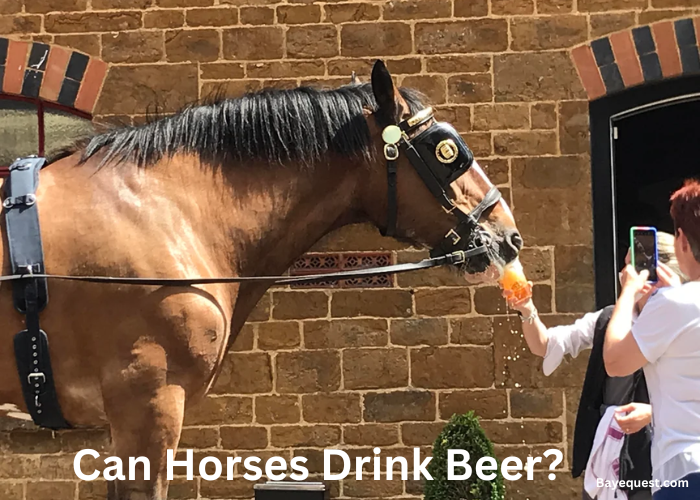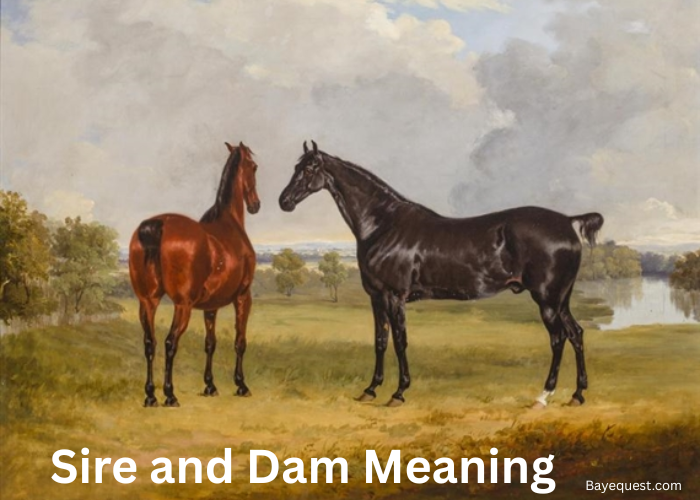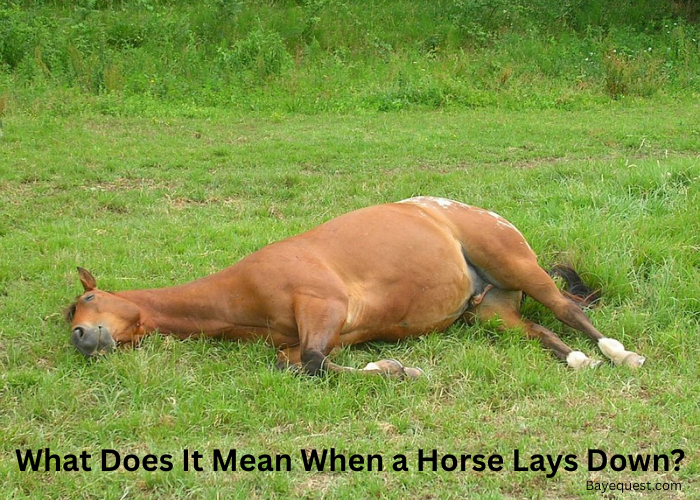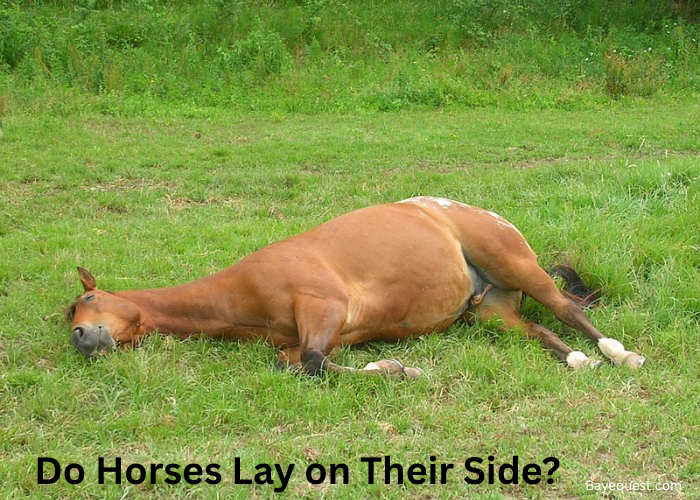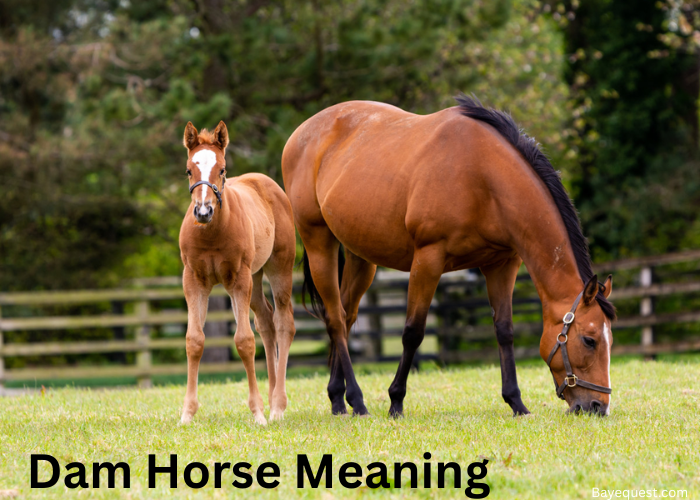Beer and horses – sounds like a quirky barnyard myth, doesn’t it? Yet if you’ve been around horse people long enough, you’ve probably heard someone mention giving their horse a bottle of Guinness after a hot day’s work. Or adding a splash of beer to the water bucket on the road.
It sparks an immediate question: Can horses really drink beer, and is it safe?
In the sections ahead, we’ll unpack the tradition, the risks, the myths, and the smarter alternatives so you’ll know exactly when – if ever – your horse should be raising a bucket of suds.
Can Horses Drink Beer?
Yes, horses can drink beer in small amounts, and many owners have safely offered it as a novelty treat for decades. Most horses enjoy the sweet, yeasty flavor, and a few traditions, such as giving Guinness to working horses, have made the practice well-known.
For healthy adult horses, an occasional beer is unlikely to cause harm.
That said, beer is not a necessary or beneficial part of a horse’s diet. It doesn’t replace water, electrolytes, or proper supplements, and overuse can stress the digestive system or worsen underlying health issues.
If you do decide to let your horse try beer, keep it rare, limit it to no more than one bottle, and always consult your vet first.
Does Beer Affect Horses?
Beer can affect horses, but the extent of the effect depends on the amount given and the individual animal’s health.
In small servings, such as a few sips or a single bottle, beer usually doesn’t cause noticeable changes in most healthy horses. Many owners give it as a lighthearted treat, and horses often enjoy the taste without showing any adverse effects.
The alcohol content is very low compared to a horse’s body weight, so mild portions rarely cause intoxication.
However, because horses have sensitive digestive systems, too much beer could lead to gas, bloating, or digestive upset. Just like with any unusual feed, moderation is the key to avoiding negative reactions.
Some horse owners have experimented with using beer to encourage drinking during travel or to support horses with anhidrosis (a condition where horses struggle to sweat).
While there are numerous anecdotes about improvements, there is no strong scientific evidence to suggest that beer directly benefits equine hydration, sweating, or performance.
In these cases, it’s likely the novelty of the flavor that encourages horses to drink, rather than the beer itself providing a health advantage.
On the other hand, overuse or frequent feeding of beer can have a negative impact on horses. Regular alcohol consumption may interfere with liver function, and added calories from beer are unnecessary in an already well-balanced equine diet.

So, Why Do Owners Give Horses Beer?
Although the alcohol in a single bottle has zero intoxicating effect on a 1,000-pound horse, owners have several explanations for upholding the ritual;
Tradition
For decades, horse enthusiasts in various parts of the world have passed down stories of beer being used as a barn treat or even as a remedy.
Guinness has gained a legendary status in some stables, with riders claiming that a dark stout helps restore energy or even supports sweating during hot summers. While that’s more folklore than fact, it’s part of the culture.
Palatability
There are several practical reasons why people continue to experiment with beer today. One of the most common is palatability.
Horses can be picky drinkers, especially when traveling and faced with unfamiliar water. Some people say adding a splash of beer to a bucket encourages them to drink more, especially if they’ve been “trained” to like the taste at home first.
In hot weather or during long-distance travel, that little trick can give peace of mind when hydration is critical.
B-Vitamin and Yeast Content
Brewers’ yeast, used in fermentation, is related to supplements already marketed for horses to support gut health and coat condition. Some owners assume beer provides the same benefit.
The truth? By the time beer is bottled and pasteurized, the yeast is largely inactive, and the vitamin levels aren’t high enough to act as a real supplement.
Still, the idea persists, especially because it fits nicely with the observation that some horses just seem to perk up after a cold one.
Anhidrosis
Anhidrosis is a condition where horses stop sweating. While not scientifically proven, many owners say that giving a daily beer might help trigger sweating again.
This belief is so widespread that it has become one of the most talked-about “reasons” for offering beer to horses.
What Kind of Beer Can Horses Drink?
When it comes to horses, not all beers are created equal. The most commonly offered type is a dark stout, such as Guinness, which has long been associated with equine traditions, especially in Europe.
Stouts are often chosen because they are smooth, malty, and lower in carbonation, making them easier for horses to drink.
However, this doesn’t mean Guinness, or any specific brand, is necessary. In truth, most light beers, lagers, and ales are safe in small amounts, as long as they don’t contain unusual additives.
The key consideration is simplicity. Beers with added flavors, fruits, spices, or high alcohol content should never be given to horses.
Also, avoid craft beers that include extra ingredients such as citrus, chocolate, coffee, or herbal infusions, since these could upset a horse’s digestive system or even be toxic.
Stick to traditional beers, which are primarily made from water, malted grains, hops, and yeast.
Another question that comes up is whether horses should be given non-alcoholic beer. While the lower alcohol content might seem safer, non-alcoholic beers often contain additional sweeteners or artificial flavors that aren’t ideal for equine digestion.

Is Beer Safe for Horses? The Veterinary View
When it comes to feeding anything unusual to horses or any other animal, the first question is always: Is it safe?
Fortunately, in the case of beer, most veterinarians agree that small amounts are generally safe for a healthy adult horse.
The alcohol content in one standard 12-ounce bottle is tiny compared to the size of a 1,000-pound animal. To put it in perspective, a horse would need to drink gallons of beer before showing signs of intoxication – something no responsible owner would allow.
For an average horse, a single serving won’t have any measurable effect on coordination, awareness, or performance.
That being said, “safe” doesn’t always mean “advisable.” The following are a few common concerns;
Empty Calories
Beer is far from a natural food for horses. It’s high in carbohydrates, contains sugars from the malted grain, and adds empty calories to the diet.
For horses that are prone to metabolic conditions like Equine Metabolic Syndrome (EMS), insulin resistance, or Cushing’s Disease (PPID), even a small sugar load can be problematic.
Likewise, easy keepers or horses with a history of laminitis are not good candidates for any extra treats that spike glucose or add unnecessary calories.
Digestive Issues
Horses have sensitive gastrointestinal systems that rely on balance in the hindgut. While beer in tiny amounts isn’t harmful, it does introduce a liquid that is fermented, carbonated, and flavored in ways their bodies aren’t designed to process.
Some horses show no reaction. But others may develop mild digestive upset if given too much or too often. Because every horse is an individual, monitoring their response is essential.
Risk Groups
There are special risk groups where beer should be avoided altogether. Horses with liver disease, for example, shouldn’t be given alcohol in any form, even if it’s diluted.
Similarly, very young horses, pregnant mares, or horses recovering from illness should adhere to proven hydration and nutrition strategies rather than relying on novelty treats.
Barn Management Risks
Open beer containers or a lingering smell around the stable can attract dogs or other animals, and hops are known to be toxic to dogs in even small amounts.
That means careless handling could put your barn companions at risk, even if your horse is healthy.
Competition and Testing Rules: Additional Repercussions of Giving Horses Beer
Even though beer may be harmless in the barn, the picture changes when competition enters the mix.
Governing bodies in equestrian sport have strict rules about what horses can ingest before and during events, and while beer isn’t a banned substance in itself, it can still raise issues. Consider the following;
Drug and Medication Testing
Organizations like the FEI (Fédération Équestre Internationale) and USEF (United States Equestrian Federation) maintain extensive lists of prohibited substances.
Alcohol isn’t specifically listed as a disqualifying agent. In practice, this means that a single beer is unlikely to trigger a positive test or cause a horse to appear “doped.”
However, testing labs are increasingly sensitive, and introducing any non-standard substance always carries a degree of risk.
Perception and Professionalism
Giving a horse a beer at home is one thing, but doing so around showgrounds or shortly before a competition can look questionable.
Even if the alcohol poses no measurable effect, officials and fellow competitors might interpret it as an attempt to manipulate performance – or simply as an unprofessional habit.
Timing also matters. A horse metabolizes the small amount of alcohol in one beer very quickly. But the safest course is to avoid offering beer within at least 24 hours of competition.
This ensures there’s no lingering trace in a sample and avoids raising eyebrows among inspectors or stewards.

How Much Beer Can Horses Drink? Safe-Use Playbook
If you do decide to let your horse try beer, the key is moderation and common sense. Veterinarians generally agree that one standard bottle (about 12 ounces/350 ml) given occasionally is the upper limit for most healthy adult horses.
That small amount is unlikely to cause any harm and is about the same volume as a cup of water – not enough to overwhelm their digestive system or contribute significantly to their calorie intake.
It’s also important to think about frequency. Beer should be an occasional novelty, not a daily staple.
Giving it too often adds unnecessary sugars and calories without delivering any real nutritional benefit. A once-in-a-while treat, maybe after a particularly hot trail ride or as part of a quirky barn tradition, is much safer than making it routine.
How you serve it matters, too. Always pour beer into a clean feed bucket or mix it into a small portion of feed.
Never offer it directly in glass bottles, which pose a breakage hazard, or cans, which can cause cuts if chewed.
And don’t let it replace water. Beer should always be an extra option, with fresh, plain water available at all times.
Finally, pay close attention to your horse’s individual response. Some horses will drink beer eagerly, while others might sniff and walk away.
If your horse shows signs of digestive upset, such as loose manure, bloating, or discomfort, skip the beer entirely and stick to safer hydration methods.
How to Introduce Horses to Beer: Step-by-Step Guide
If you’ve weighed the pros and cons and still want to let your horse try beer, it’s best to do it in a careful, thoughtful way. Here’s a simple playbook to follow:
Step 1: Talk to your vet
Every horse is different, and health conditions like metabolic syndrome, laminitis, or liver issues make beer a bad idea. A quick conversation with your veterinarian ensures you’re not taking an unnecessary risk.
Step 2: Choose the right context
Choose a calm, low-stress moment, such as after a ride at home on a warm but not excessively hot day. Avoid offering beer before travel, competitions, or in situations where hydration is critical.
Step 3: Start small
Offer just a few ounces mixed in with water or poured over the feed the first time. This lets you see how your horse reacts to the taste and ensures there’s no digestive upset.
Step 4: Serve it safely
Always pour beer into a clean bucket or feed tub. Never hand a horse a glass bottle or can, since breakage and sharp edges can cause injury.
Make sure plain water is available alongside the flavored option.
Step 5: Monitor and adjust
Watch your horse afterward for signs of digestive discomfort, unusual behavior, or disinterest. If all seems normal, an occasional treat of up to one bottle is generally considered safe for healthy horses.
If not, discontinue immediately.
Step 6: Keep it occasional
Beer shouldn’t become a daily habit. Use it sparingly as a novelty treat, not as a dietary supplement or regular hydration strategy.
Following these steps helps you enjoy the tradition responsibly, keeping your horse’s health and safety at the forefront. Remember, beer should always be a treat, never a tool.
Check out the best healthy horse treats in this article.
Debunking Common Myths on Horses and Beer
There’s no shortage of barn myths and half-truths when it comes to horses and beer. Let’s clear up some of the most common ones with straightforward answers.
Myth #1: Guinness makes horses sweat again
This is the most famous belief, especially in hot climates where anhidrosis is a concern.
Fact: While some horses seem to start sweating again after being given beer, there’s no scientific proof that Guinness – or any beer – directly affects sweating. What’s more likely is a coincidence, a natural fluctuation in the condition, or other management changes that happened at the same time.
Myth #2: Dark stout is best
Some owners insist that dark beers like Guinness are superior because they contain more yeast or nutrients.
Fact: The differences are minimal, and once beer is pasteurized, most of the yeast is inactive anyway. Whether it’s a pale lager or a stout, the impact on your horse is essentially the same.
Myth #3: Alcohol is dangerous in any amount.
This one has a grain of truth – alcohol can absolutely be dangerous to animals. But it’s not entirely true.
Fact: A single beer isn’t enough to cause measurable effects in a 1,000-pound animal. Safe in tiny amounts? Usually yes. Useful? Not really.
Myth #4: Non-alcoholic beer is always safer.
Not necessarily true.
Fact: Non-alcoholic beers often contain more sugar, which can be a problem for horses prone to laminitis, insulin resistance, or Cushing’s. While the lack of alcohol may seem safer, you’re still offering an unnecessary, sugary drink that doesn’t add health value.
Myth #5: Beer can replace electrolytes.
This is false.
Fact: Beer contains some minerals, but not in the right balance or concentration to replace what a horse loses in sweat. Only proper electrolyte formulas – or carefully managed salt intake – can do that job effectively. Beer should never be thought of as a substitute.
FAQs
Can horses get drunk?
Yes, horses can get drunk, but it would take a large amount of alcohol for intoxication to occur. A single beer or small serving won’t make a horse drunk, though excessive alcohol could cause coordination issues, digestive upset, or even serious health risks.
Do horses like beer?
Many horses do like beer because of its sweet, malty taste and fizzy texture. Some owners even report their horses eagerly lapping it up when offered. However, not every horse enjoys it, and preferences vary just like they do with other treats.
Conclusion
Small amounts of beer are generally safe for healthy adult horses. Many owners offer it as a quirky treat, a barnyard tradition, or even in hopes of managing conditions like anhidrosis – with no serious downsides.
However, beer is not a proven supplement; it doesn’t replace proper hydration or electrolytes, and it carries risks if overused or given to horses with health issues.




